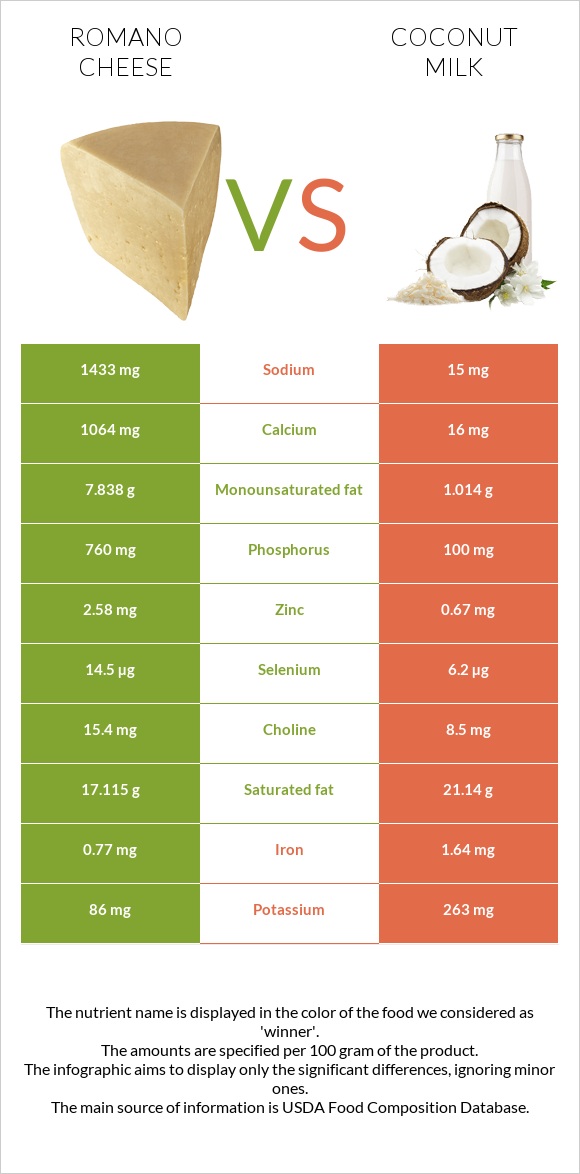Romano cheese vs. Coconut milk — In-Depth Nutrition Comparison
Compare
A recap on the differences between romano cheese and coconut milk
- Romano cheese is higher in calcium, phosphorus, vitamin B12, vitamin B2, and zinc, yet coconut milk is higher in manganese and copper.
- Romano cheese covers your daily calcium needs 105% more than coconut milk.
- The amount of cholesterol in coconut milk is lower.
- The glycemic index of romano cheese is lower.
Food varieties used in this article are Cheese, romano and Nuts, coconut milk, raw (liquid expressed from grated meat and water).
Infographic

Infographic link
Mineral Comparison
Mineral comparison score is based on the number of minerals by which one or the other food is richer. The "coverage" charts below show how much of the daily needs can be covered by 300 grams of the food.
| Contains more CalciumCalcium | +6550% |
| Contains more ZincZinc | +285.1% |
| Contains more PhosphorusPhosphorus | +660% |
| Contains more SeleniumSelenium | +133.9% |
| Contains more PotassiumPotassium | +205.8% |
| Contains more IronIron | +113% |
| Contains more CopperCopper | +786.7% |
| Contains less SodiumSodium | -99% |
| Contains more ManganeseManganese | +4480% |
Vitamin Comparison
Vitamin comparison score is based on the number of vitamins by which one or the other food is richer. The "coverage" charts below show how much of the daily needs can be covered by 300 grams of the food.
| Contains more Vitamin AVitamin A | +∞% |
| Contains more Vitamin EVitamin E | +53.3% |
| Contains more Vitamin DVitamin D | +∞% |
| Contains more Vitamin B1Vitamin B1 | +42.3% |
| Contains more Vitamin B2Vitamin B2 | +∞% |
| Contains more Vitamin B5Vitamin B5 | +131.7% |
| Contains more Vitamin B6Vitamin B6 | +157.6% |
| Contains more Vitamin B12Vitamin B12 | +∞% |
| Contains more Vitamin KVitamin K | +2100% |
| Contains more Vitamin CVitamin C | +∞% |
| Contains more Vitamin B3Vitamin B3 | +887% |
| Contains more FolateFolate | +128.6% |
All nutrients comparison - raw data values
| Nutrient |  |
 |
DV% diff. |
| Calcium | 1064mg | 16mg | 105% |
| Phosphorus | 760mg | 100mg | 94% |
| Sodium | 1433mg | 15mg | 62% |
| Protein | 31.8g | 2.29g | 59% |
| Vitamin B12 | 1.12µg | 0µg | 47% |
| Manganese | 0.02mg | 0.916mg | 39% |
| Cholesterol | 104mg | 0mg | 35% |
| Vitamin B2 | 0.37mg | 0mg | 28% |
| Copper | 0.03mg | 0.266mg | 26% |
| Saturated fat | 17.115g | 21.14g | 18% |
| Zinc | 2.58mg | 0.67mg | 17% |
| Monounsaturated fat | 7.838g | 1.014g | 17% |
| Selenium | 14.5µg | 6.2µg | 15% |
| Iron | 0.77mg | 1.64mg | 11% |
| Vitamin A | 96µg | 0µg | 11% |
| Fiber | 0g | 2.2g | 9% |
| Calories | 387kcal | 230kcal | 8% |
| Fats | 26.94g | 23.84g | 5% |
| Potassium | 86mg | 263mg | 5% |
| Vitamin B5 | 0.424mg | 0.183mg | 5% |
| Vitamin B3 | 0.077mg | 0.76mg | 4% |
| Vitamin B6 | 0.085mg | 0.033mg | 4% |
| Vitamin C | 0mg | 2.8mg | 3% |
| Vitamin D | 20 IU | 0 IU | 3% |
| Vitamin D | 0.5µg | 0µg | 3% |
| Vitamin K | 2.2µg | 0.1µg | 2% |
| Folate | 7µg | 16µg | 2% |
| Polyunsaturated fat | 0.593g | 0.261g | 2% |
| Carbs | 3.63g | 5.54g | 1% |
| Magnesium | 41mg | 37mg | 1% |
| Vitamin E | 0.23mg | 0.15mg | 1% |
| Vitamin B1 | 0.037mg | 0.026mg | 1% |
| Choline | 15.4mg | 8.5mg | 1% |
| Net carbs | 3.63g | 3.34g | N/A |
| Sugar | 0.73g | 3.34g | N/A |
| Tryptophan | 0.429mg | 0.027mg | 0% |
| Threonine | 1.171mg | 0.083mg | 0% |
| Isoleucine | 1.685mg | 0.09mg | 0% |
| Leucine | 3.071mg | 0.17mg | 0% |
| Lysine | 2.941mg | 0.101mg | 0% |
| Methionine | 0.852mg | 0.043mg | 0% |
| Phenylalanine | 1.71mg | 0.116mg | 0% |
| Valine | 2.183mg | 0.139mg | 0% |
| Histidine | 1.231mg | 0.053mg | 0% |
Macronutrient Comparison
Macronutrient breakdown side-by-side comparison
Protein:
31.8 g
Fats:
26.94 g
Carbs:
3.63 g
Water:
30.91 g
Other:
6.72 g
Protein:
2.29 g
Fats:
23.84 g
Carbs:
5.54 g
Water:
67.62 g
Other:
0.71 g
| Contains more ProteinProtein | +1288.6% |
| Contains more FatsFats | +13% |
| Contains more OtherOther | +846.5% |
| Contains more CarbsCarbs | +52.6% |
| Contains more WaterWater | +118.8% |
Fat Type Comparison
Fat type breakdown side-by-side comparison
Saturated fat:
Sat. Fat
17.115 g
Monounsaturated fat:
Mono. Fat
7.838 g
Polyunsaturated fat:
Poly. Fat
0.593 g
Saturated fat:
Sat. Fat
21.14 g
Monounsaturated fat:
Mono. Fat
1.014 g
Polyunsaturated fat:
Poly. Fat
0.261 g
| Contains less Sat. FatSaturated fat | -19% |
| Contains more Mono. FatMonounsaturated fat | +673% |
| Contains more Poly. FatPolyunsaturated fat | +127.2% |





